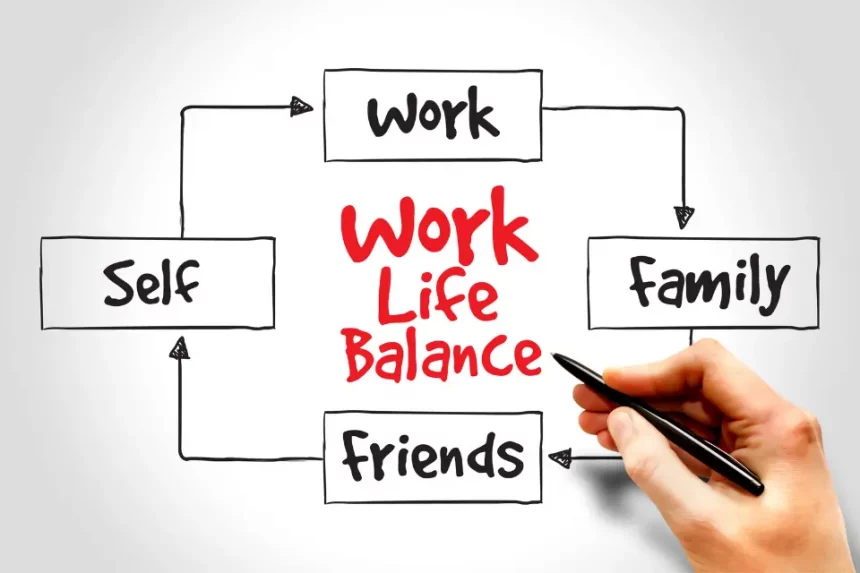Life can be hectic, and managing stress can often feel like an uphill battle. However, it doesn’t have to be that way. With a few simple lifestyle changes, you can learn to manage stress and lead a balanced life. From exercising regularly to carving out time for yourself, there are a variety of tools at your disposal to help you cope with stress and maintain a healthy lifestyle.
In this article, we will explore five simple ways to manage stress and lead a balanced life. You’ll learn the importance of healthy habits, such as eating nutritious foods and engaging in mindful activities, as well as how to set limits and create a support system. So, if you’re feeling overwhelmed, don’t worry — these five tips can help you get back on track and lead a more balanced life.
Simple Ways To Manage Stress and Lead A Balanced Life
1. The importance of healthy habits
Healthy habits, such as eating nutritious foods and getting enough sleep, are instrumental in managing stress and improving your overall wellbeing. Eating a well-balanced diet and maintaining a healthy weight can help to improve your mood and reduce anxiety and depression. Furthermore, eating a diet rich in fruits and vegetables can help to reduce the risk of developing chronic diseases, such as cardiovascular disease and type 2 diabetes, which are associated with stress.
Getting enough sleep is also crucial for maintaining a healthy lifestyle, as it can help to improve your mental health, reduce tiredness, and reduce the risk of accidents. Sleep can also help to improve relationships, as it can reduce snoring, as well as help to reduce stress levels.
2. Exercising regularly
Regular exercise is another important aspect of managing stress and maintaining a healthy lifestyle. Physical activity can quickly help to reduce stress and improve your mental health, as well as your overall wellbeing. Additionally, engaging in regular exercise can help to reduce risk factors associated with chronic diseases, such as cardiovascular disease, type 2 diabetes, and certain cancers.
Moreover, exercise can help to boost your mood and promote feelings of relaxation, alongside helping you to focus better at work. There are a variety of different physical activities that you can engage in to help you manage stress. For example, you can try meditating, engaging in yoga, or going for a run or a walk in nature.
3. Eating nutritious foods
Healthy habits, such as eating nutritious foods and getting enough sleep, are instrumental in managing stress and improving your overall wellbeing. Eating a well-balanced diet and maintaining a healthy weight can help to improve your mood and reduce anxiety and depression.
Furthermore, eating a diet rich in fruits and vegetables can help to reduce the risk of developing chronic diseases, such as cardiovascular disease and type 2 diabetes, which are associated with stress. Getting enough sleep is also crucial for maintaining a healthy lifestyle, as it can help to improve your mental health, reduce tiredness, and reduce the risk of accidents. Sleep can also help to improve relationships, as it can reduce snoring, as well as help to reduce stress levels.
4. Engaging in mindful activities
Engaging in mindfulness activities can help you to manage stress and improve your mental health. There are numerous ways in which you can practice mindfulness, which include meditation, yoga, and walking. Practicing mindfulness can help you to relax and relieve stress by focusing on your breath, slowing down, and concentrating on the present moment, rather than what is stressing you out.
Regularly engaging in mindful activities can also help to improve your focus and attention span, as well as your relationships with yourself and others. Furthermore, practicing mindfulness can help you to recognize when you’re experiencing negative emotions and find healthy ways to manage them.
5. Setting limits
Setting healthy boundaries is important for managing stress and maintaining a healthy lifestyle. Healthy boundaries are the limits that you place on yourself and your time in order to reduce the amount of stress in your life. For example, you can set a limit on the number of hours that you spend working each day, or you can set a limit on how many events you attend each week.
Setting boundaries can help you to prioritize your time and make sure that your important priorities, such as work and relationships, are not being neglected due to stress. Moreover, setting boundaries can help you to reduce feelings of anxiety and make you feel more in control of your life.
6. Creating a support system
Having a strong support system can help to reduce feelings of isolation and provide you with a sense of security. Having a support system can help to reduce feelings of stress that are often associated with leading a busy life, while also promoting feelings of happiness and optimism.
There are many different ways that you can create a support system. For example, you can join a support group, such as one for people with a chronic illness, or you can create a support system online by joining a forum or connecting with people on social media.
7. Taking time for yourself
Taking time for yourself is an important part of managing stress and maintaining good mental health. We often don’t realize how important rest and relaxation are for our health and wellbeing. Taking time for yourself can help to reduce feelings of isolation and provide you with a sense of security.
Moreover, it can help to improve your mental health and reduce feelings of stress, while also promoting feelings of happiness and optimism. There are a variety of different ways that you can take time for yourself. You could try meditating or going for a walk in nature, or you could try a new hobby that you’ve always wanted to try, such as painting or pottery.
8. Making time for relaxation
Making time for relaxation is an essential part of leading a balanced life and managing stress. Relaxation can help to reduce feelings of stress and improve your mental health, as well as your overall wellbeing. There are a variety of different relaxation techniques that you can try out, including guided imagery and breathing exercises. There are also many different relaxation apps that you can try, such as Calm and Headspace.
9. Seeking professional help if needed
While most of these five tips can help you to manage stress, there may come a time when you need more help. In these instances, it’s important to reach out for professional help. You can seek the help of a therapist or counselor who can guide you through the process of relaxation and help you to manage your stress levels.
10. Summary of how to manage stress and lead a balanced life
In this article, we’ve explored five simple ways to manage stress and lead a balanced life, including the importance of healthy habits, such as eating nutritious foods and getting enough sleep, as well as exercising regularly.
You can also engage in mindful activities and set limits, while creating a strong support system to receive the help and support that you may need. Finally, taking time for yourself to relax and unwind is an important part of leading a balanced life and managing stress.

















